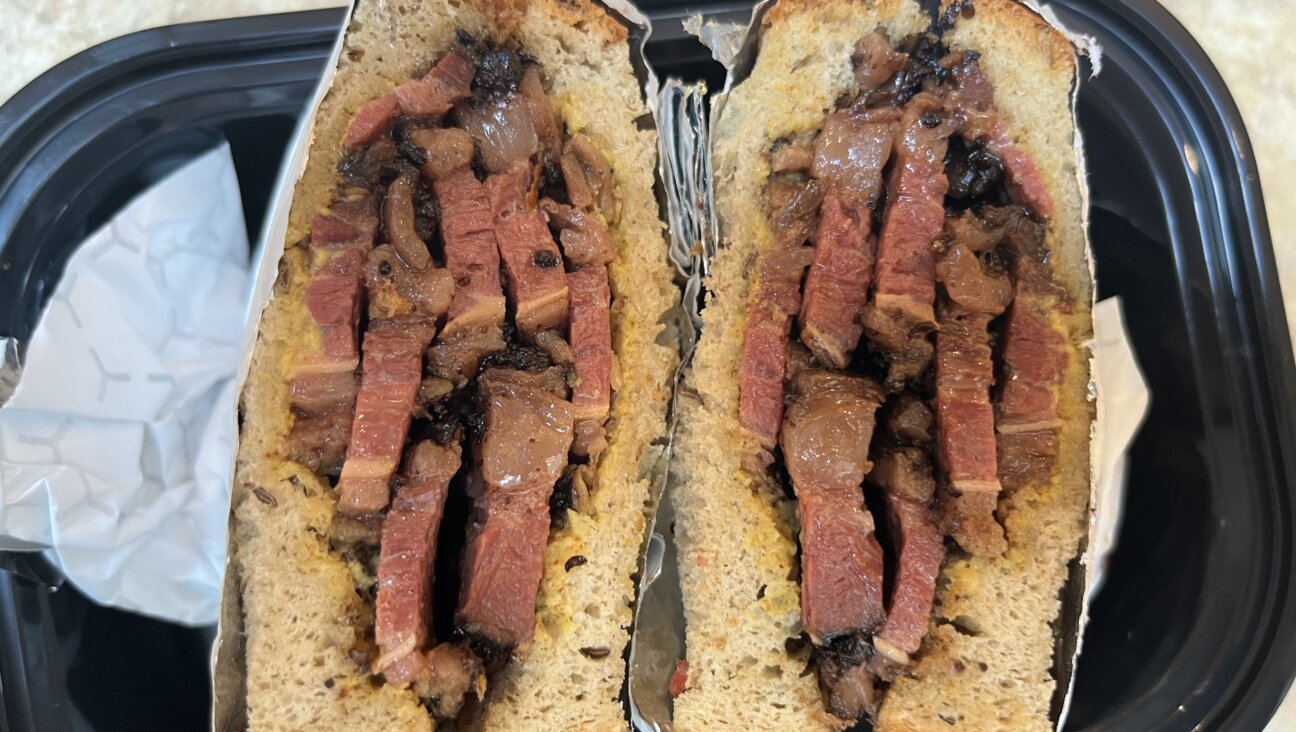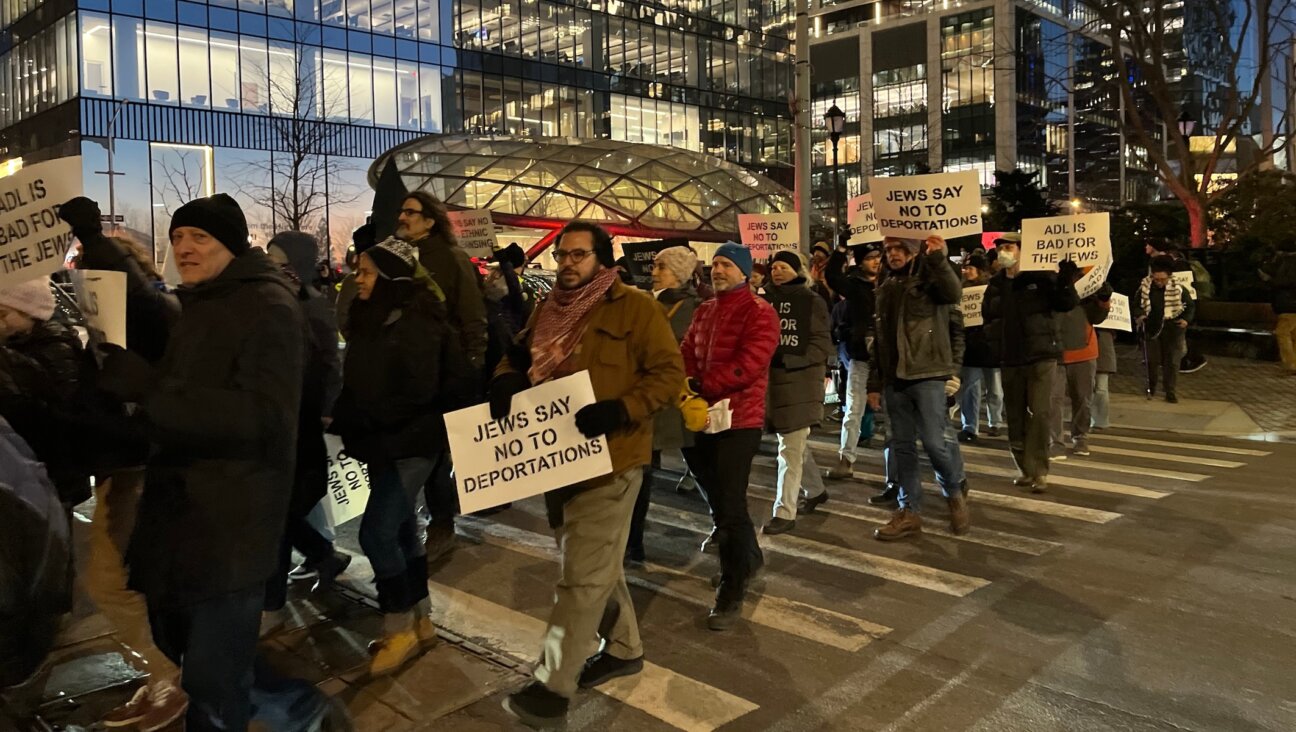After year of isolation, fully vaccinated grandparents head to in-person Passover seders

John and Ellen Moir playing outdoors and masked with their three-year-old grandson.
Ruth and Jerry Kirschner haven’t seen four of their grandchildren, ages 7 through 12, since January 2020. “This is the age when you want to see them,” Ruth said. “They’re young. They understand we can’t be with them, but they’re always like, ‘How much longer? How much longer?’”
Thanks to the COVID-19 vaccine, the Kirschners can finally say it won’t be much longer. The retired couple, based in Chicago, normally visit with their Boca Raton, Fla. grandkids at least three times a year. But amid the pandemic, as social isolation became a public health mandate and cross-state travel an unwise medical risk, they’ve spent the last 15 months hundreds of miles away. Now, with their second vaccine doses administered, they plan to fly out to Florida in a couple of weeks — just in time to hide the afikoman and hear their youngest ask, “Why is this night different from all other nights?”
For Passover 2020, Lidia Epel had already booked flights to visit her daughter and grandchildren. “But Passover came and the pandemic started,” Epel, 79, said. “I still have that ticket, I never came.”
The last time the New York-based grandmother had seen her teenaged twin grandkids was in 2019. After two vaccine doses and the proper waiting period, “I decided I’d had enough of not seeing my grandchildren,” she said. On Feb. 10, Epel flew to Florida, rented a place near her daughter and has been there ever since.
“It was very emotional,” she recalled of seeing her grandchildren for the first time in so long. “They have changed.”

Chicago-based Jerry and Ruth Kirschner visiting their grandchildren in Florida shortly before the pandemic outbreak. Courtesy of Kirschner family
Last year on Passover, Ruth Kirschner said, “It was just the two of us at home.” With her four Chicago-based grandchildren — aged 3, 7, 9, and 11 — she’s tried to prioritize outdoor activities. And when the midwest’s weather made that impossible, she and her husband turned to brief indoor, masked and distanced gatherings. Two weeks from now, all that can finally change.
“They’ve made a reservation for a sleepover at our house,” she said. “Popcorn, movie, ice cream — it’s all in the works.” Jerry Kirschner, 73, interjected: “It’s two weeks away.”
The lost year: ‘We’re never getting it back’
Ellen and John Moir (pictured at the top of this article) have spent the past year visiting with their son and grandsons — one born just weeks before the pandemic hit — every other weekend masked and outdoors. The weather in California makes the 45-minute drive from Santa Cruz to Monterey worth it for porch-only visits, but there’s something important missing for the retired couple.
“We haven’t hugged or kissed the boys in a whole year,” Ellen, 71, said. “That’s been one of the hardest things.” As their older grandson turns four in a few weeks, John admitted that he and his wife began to feel the weight of the “lost year.” “We’re never getting it back. Oh my goodness, we don’t want to wait any longer.”

Ruth Kirschner baking hamentashen with her granddaughter before Purim 2020. It was the last time the two have seen each other. Courtesy of Kirschner family
So on March 17, after their allotted waiting period post-second-dose has passed, “we’re giving some kisses away,” the grandmother said. They recognize, the couple explained, that even with both doses of the vaccine, some risks remain and mask-wearing continues to be CDC recommended protocol. But after a year of warning their beloved three-year-old grandson to “not get too close to grandma and grandpa,” hugging him is a risk they feel is worth taking.
“We’re not sure what it’s going to be like,” John said. “We’re going to have to let the kids be the guide… it’ll be as strange for them as it is for us.”
At the end of the day, for these vaccinated grandparents, despite knowledge of the risks inherent to flying to visit family or taking off their masks to kiss their grandchildren, they’ve come to the conclusion it’s a risk they’re willing to accept.
“The more I read, the more I understand that really there’s no instructions,” Ruth Kirschner said. “We don’t go anywhere, we don’t go to restaurants, we do curbside grocery pickup. So it’s really a scary step to take.”
The vaccine, after all, is not full proof, she said: A small percentage of fully vaccinated people can still become infected with the coronavirus.
“It’s just that at some point, you have to start living,” Kirschner said. “So we’re going to start living.”
Her excitement to see her grandkids can only be matched by their excitement to see her. In the meantime:
“Well, they’re telling us things that they would like us to buy them.”
Marie-Rose Sheinerman is a news intern at the Forward. Contact her at [email protected] or follow her on Twitter @RoseSheinerman.
The Forward is free to read, but it isn’t free to produce

I hope you appreciated this article. Before you go, I’d like to ask you to please support the Forward.
Now more than ever, American Jews need independent news they can trust, with reporting driven by truth, not ideology. We serve you, not any ideological agenda.
At a time when other newsrooms are closing or cutting back, the Forward has removed its paywall and invested additional resources to report on the ground from Israel and around the U.S. on the impact of the war, rising antisemitism and polarized discourse.
This is a great time to support independent Jewish journalism you rely on. Make a gift today!
— Rachel Fishman Feddersen, Publisher and CEO
Support our mission to tell the Jewish story fully and fairly.
Most Popular
- 1

Opinion The dangerous Nazi legend behind Trump’s ruthless grab for power
- 2

Opinion A Holocaust perpetrator was just celebrated on US soil. I think I know why no one objected.
- 3

Culture Did this Jewish literary titan have the right idea about Harry Potter and J.K. Rowling after all?
- 4

Opinion I first met Netanyahu in 1988. Here’s how he became the most destructive leader in Israel’s history.
In Case You Missed It
-

Culture I have seen the future of America — in a pastrami sandwich in Queens
-

Culture Trump wants to honor Hannah Arendt in a ‘Garden of American Heroes.’ Is this a joke?
-

Opinion Gaza and Trump have left the Jewish community at war with itself — and me with a bad case of alienation
-

Fast Forward Trump administration restores student visas, but impact on pro-Palestinian protesters is unclear
-
Shop the Forward Store
100% of profits support our journalism
Republish This Story
Please read before republishing
We’re happy to make this story available to republish for free, unless it originated with JTA, Haaretz or another publication (as indicated on the article) and as long as you follow our guidelines.
You must comply with the following:
- Credit the Forward
- Retain our pixel
- Preserve our canonical link in Google search
- Add a noindex tag in Google search
See our full guidelines for more information, and this guide for detail about canonical URLs.
To republish, copy the HTML by clicking on the yellow button to the right; it includes our tracking pixel, all paragraph styles and hyperlinks, the author byline and credit to the Forward. It does not include images; to avoid copyright violations, you must add them manually, following our guidelines. Please email us at [email protected], subject line “republish,” with any questions or to let us know what stories you’re picking up.
















